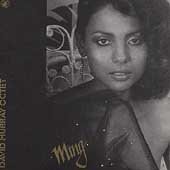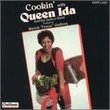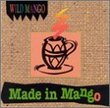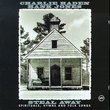| All Artists: David Murray Title: Ming Members Wishing: 4 Total Copies: 0 Label: Black Saint Release Date: 9/7/1993 Genres: Jazz, Pop, Broadway & Vocalists Styles: Avant Garde & Free Jazz, Traditional Vocal Pop Number of Discs: 1 SwapaCD Credits: 1 UPCs: 0002731200452, 027312004519, 027312004526, 027312004540 |
Search - David Murray :: Ming
 | David Murray Ming Genres: Jazz, Pop, Broadway & Vocalists
That tenor saxophonist David Murray's Ming was recorded in the 1980s is no small feat, as that era was the dawn of the neoconservative movement. All who returned to jazz-band setups then seemed tracked for high dry-cleanin... more » |
Larger Image |
CD DetailsSynopsis
Amazon.com That tenor saxophonist David Murray's Ming was recorded in the 1980s is no small feat, as that era was the dawn of the neoconservative movement. All who returned to jazz-band setups then seemed tracked for high dry-cleaning bills on their suits and a modicum of attention from the likes of Time and Newsweek, writing on the rebirth of jazz. But Ming was coming from an altogether different direction. Murray was a 25-year-old prodigy heavily schooled in the avant-garde fests he snagged in the World Saxophone Quartet and elsewhere. And so he took 1960s mainstream styles like hard bop and shot them through a kaleidoscope of complex group arrangements, spicing them severely with his inestimable chops, his awesome command of the tenor sax and bass clarinet, from their lowest depths to their most skating, tonal heights. In hindsight, his band on Ming looks like a jazz summit: pianist Anthony Davis sparring with alto saxist Henry Threadgill; trumpeter Olu Dara wrapping brass lines around cornetist Butch Morris's cryptic, limber bends and curves; George Lewis holding the low brass on trombone with drummer Steve McCall; and bassist Wilbur Morris pushing fast and hard, then dipping into a soul-laced bag while Murray indulges his best ballad chops. Ming is a classic that deserves its status. --Andrew Bartlett Similarly Requested CDs
|
CD ReviewsA Jazz Classic From A Master of Progressive Jazz Ron Frankl | Hendersonville, NC | 12/12/2000 (5 out of 5 stars) "David Murray's "Ming" is simply one of the best jazz albums of all time; a contemporary and progressive album that is also rooted in jazz traditions. It remains the perfect introduction to a gifted musician who is sadly unappreciated today.The Oakland-born Murray arrived in New York City in 1975 at age 20 and quickly established himself as a force on the "Loft Jazz" scene, a brief but important jazz movement. Rather than seek their fortune with the jazz fusion that was popular at the time, Murray and his loft co-horts sought to consolidate the ideas of the avant garde and free jazz movements of the Sixties and Seventies while adding their own ideas. It was an exciting period, and David Murray soon emerged as a rising star. Murray's intense early recordings in small group formats show a musician heavily influenced by John Coltrane, but also with a flair for striking original composition. Working with only a rhythm section was limiting, however, and the saxophonist became interested in pursuing his ideas with in a larger group.David Murray was all of 25-years old when he recorded "Ming" (named for his second wife) in 1980. It was the first recording to feature his Octet (eight piece group), which was soon to become one of the most acclaimed groups in jazz. Murray's writing and arranging talents were readily apparent on "Ming," a welcome addition to a jazz scene that had de-valued such strengths for a number of years. The Octet also featured such other young talents as Olu Dara, Anthony Davis and Henry Threadgill, soon to become major figures on their own.Murray's greatest strength, though, is as a tenor saxophonist. Arguably the greatest voice on the instrument since John Coltrane's death in 1967, "Ming" was the first recording to fully display both the fierce and tender side of Murray's playing. This recording is the first full realization of Murray's talents and ambitions and twenty years later, its lost none of its power. His compositions also stand up well, exhibiting the influence of Duke Ellington and Charles Mingus at times, but never in an imitative manner.Sadly, David Murray has never gotten the acclaim in America that he deserves. The intelligent and progressive music he offered was swept aside in favor of the reactionary school led by Wynton Marsalis and others who, while talented and well-schooled, were less adventurous in their music. Murray remains vital and active as of this writing, living in France and revisiting his homeland only once or twice a year. Luckily, he has always been appreciated in both Europe and Asia, and he still records frequently. "Ming" is both challenging and beautiful, and is the perfect place to start for anyone curious about David Murray." Sublime! G. M. Leonard | Southampton, UK | 06/12/1999 (5 out of 5 stars) "Nearly twenty years old, but still able to surprise and delight. One of the classic jazz albums which should be ranked with "Kind of Blue" and "Giant Steps". This album, together with "Home" put Murray on the jazz map and together they still stand as two of his best works. Both were recorded for the Italian Black Saint label which has produced his best discs over the years. Although Murray stands out, there is great ensemble playing from the whole of the octet. It's impossible to select a single track above the others as they are all outstanding. Sublime." Addendum kibblenibbler | CT | 05/28/2007 (5 out of 5 stars) "in response to Pharoah S. Wail, an amazon customer/reviewer whose writing/commentary is typically right on the mark, it must be noted that both the title and the content of his review for Ming are, in this writer's estimation, at least, somewhat off. first, Pharoah notes that Ming is "Great music" with "lackluster sound." to be sure, Black Saint recordings are not particularly known for their high-fidelity, so to speak. still, one must not forget, however, that Black Saint/Soul Note/etc were small, indie-type labels with nowhere near the resources available to them that majors both had and, indeed, continue to have. as such, it is somewhat spurious to compare Ming's sound to that of Nelson's Blues and the Abstract Truth, originally recorded as it may have been in 1961 or so, which was/is on Impulse!, a major. technology certainly changed for the better between 1961 and 1980, for sure, but what Impulse! had to work with in 1961 was simply the very best, the state of the art. this was, in all likelihood, not what Black Saint had going for them. as is, nor should Ming, for that matter, be compared sound-wise to Octet Plays Trane either, for recording technology evolved considerably, more than it actually did in many respects between 1961 and 1980, multitracking notwithstanding, in the years between Ming's recording and Octet's. finally, this writer must also note that when compared to those recordings in his collection, regardless of and/or across genres and decades, that truly have lackluster sound, Ming sounds positively vibrant. a great recording in all respects, Ming is certainly worth your checking out."
|

 Track Listings (5) - Disc #1
Track Listings (5) - Disc #1




